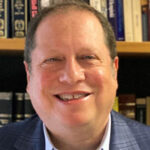Community Blog Commencement 2024:
Remarks by Hebrew College Hillson/Bronstein Award Winner

It’s my great honor to accept the Hillson/Bronstein Award this year, an award named for two passionate and inspirational educators, Sidney Hillson and Rose Bronstein.
I’m especially pleased to be here today given my connections to various people with whom I share a love of the Hebrew language who are associated with this award and with the College.
The first recipient of this award when it was newly renamed in 2015 was Arnee Winshall, with whom I have worked over the years on various projects in Hebrew education.
Professor Vardit Ringvald received the Hillson award in 1999. I work closely with Vardit to this day, especially supporting her work at Brandeis to create a consortium of Universities across North America that offer graduate programs in the teaching of Hebrew using the proficiency approach.
And my friendship of close to forty years with Rabbi Sharon Cohen Anisfeld has always had a special connection to the Hebrew language especially when I think about the various times we’ve spent together in Israel.
I believe Achad HaAm was the first to use the term Yelidey Haaretz, to mean those born in the Land of Israel as the new Yishuv was growing and a new reality of a living breathing Hebrew speaking society was coming into being. In a certain sense the Hebrew language was in its ancient origins and development, Yelidat HaAretz, born of the land and in its Tchiya, in its rebirth, was and is newly Yelidat HaAretz. In other words, the Hebrew language is indigenous to the Land of Israel.
My love affair with the Hebrew language is both about its being at the heart of the beauty and resonance of classic Jewish texts and about the ways in which the tones and rhythms of spoken modern Hebrew express and reflect the vibrancy and humanity of Israeli life and culture, in Israeli society’s day to day experience, in its music, in its poetry. In its strengths and weaknesses, in its successes and failures as our people struggles in the historic move from powerlessness to having power and sovereignty, as imperfect and challenging as that process can be.
Graduates, as you embark on your life’s work of empowering Jews to find community, in owning their tradition, of creating new Jewish expressions, I encourage you to make Hebrew a part of that, not as a burdensome task we often associate with teaching and learning languages, but as part of a love affair with the Jewish people and as an essential element of moving from Jewish disempowerment to what I like to call Jewish cultural sovereignty.


